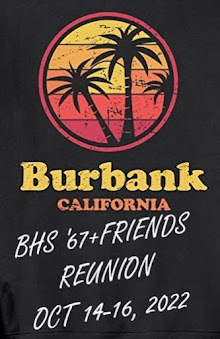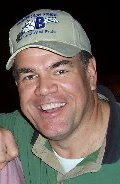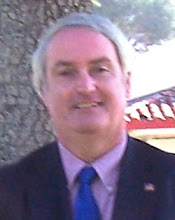

(PFC William H. Bric III was born on March 11, 1949. He died on August 23, 1968. This is a letter to his older brother.)
Don Ray
September 16, 1989
Mr. Stephen C. Bric
Dear Steve:
I'm writing to you because you're the most senior member of the Bric family that I could locate without actually talking to anyone directly.
This is the letter I've been meaning to write to you and your parents for 21 years -- but couldn't. Many times I hesitated for fear of the pain it might trigger in your parents. But it was just as much for fear of my own pain that I held back.
I'm sure you've never met me. You probably knew my sister, Nancy, from school. I went by the name of Don Ripley then, but that still shouldn't ring a bell. Suffice it to say I knew of you at John Muir Junior High as Bill Bric's older brother. That made you special in my eyes.
It's a long walk from Capitol Hill to the Vietnam Veterans' Memorial -- but there was no other way for me to get there. It was February of 1988. I was in Washington D.C. to cover a congressional hearing that involved a Los Angeles news story. I stayed an extra day with a fellow journalist who lives a block away from the Library of Congress, the Supreme Court and the U.S. Capitol. I was glad he had a prior engagement the next morning. That meant I could go off on my own without having to explain. I knew I had to go to the Memorial -- but also I knew I couldn't say the words aloud. It wasn't on the Capitol Mall maps posted here and there. It was obviously too new. I knew I couldn't ask for directions or even tell a cab driver where I had to go -- I knew there was too much of something in me that was pounding to get out.
So I wrapped my wool scarf tightly around my ears, jammed my hands in my overcoat pockets and I walked.
The only person I was going there to see was Bill.
As I walked through the snow in the direction of the Washington Monument I tried to remember as much as I could about Bill. I remembered a rainy morning, also in February, but in 1966. A girl I had been seeing called to tell me her brother Steve had died. Steve was about 13 at the time and had been confined to a wheelchair his whole life. Steve had enjoyed chasing his sister and me up and down the sidewalk in his wheelchair. He could maneuver himself so quickly. I remember feeling how he had been cheated in life. His sister said Steve didn't have a lot of friends -- not even enough for a full complement of pall bearers. She was three short and asked if I'd help out.
My mother heard my half of the conversation and waited for me to hang up before she asked me. "Why did you turn her down?" It was one of those questions that didn't require an answer. I thought about it for less than a moment and called my friend back.
"That's nice of you," she said, "but we're still two short. Do you know anyone else who will help?" The funeral was the next day. I called every close friend and then started calling kids I knew from school. Of course, Bill Bric didn't hesitate for an instant. He had never met Steve. In fact, he wasn't sure who Steve's sister was. "Sure, I'll be there," he said. "But I don't have a suit. I'll see what I can do."
The next morning Bill was there, as promised, in an oversized Navy pee coat I believe he borrowed from your father. I learned altruism from him that rainy morning.
Bill was a quiet and gentle person. That made it all that much more surprising the following year when word buzzed around Burbank High School that someone had taken on the heretofore meanest guy at school and won -- and it was Bill Bric that did it. The guy I'd never seen angry apparently stepped forward when the self-proclaimed bad guy picked a fight with someone Bill thought was much too small. Bill wasn't a whole lot bigger, but he stepped in anyway. He taught me about sticking to one's beliefs -- even when the odds were drastically skewed in the other guy's favor.
One day Bill told me about his involvement with the Burbank Police Explorers. By now I really looked up to Bill. It didn't take any coaxing to get me to join up. We had a lot of fun directing traffic during events at the Starlight Bowl. Bill had me convinced I should be a policeman.
When we had outgrown the Explorers program and graduated from high school I didn't see Bill for a few months. Then he resurfaced as an Army trainee. I told him I had taken the test for the Air Force and was hoping that when I enlisted I'd get a good assignment. Bill spent a good three hours explaining why I was fool to join the Air Force -- a four-year commitment, no job guarantee. He was in for only three years and there was no question that he'd wear a green beret one day. He asked if I'd go with him to his recruiter and listen to what the man had to say.
As I neared the long reflective pond that stretches its way like a blue carpet up to the steps of the Lincoln Memorial, I realized that back then I was able to actually do something for Bill -- he got a three-day pass for signing me up in the Army. I remembered how he coached me in how to prepare for basic training. He said that if I took control of things during the reception period -- showed some leadership and all -- that I'd surely be appointed as a squad leader. He was right about that.
Even though Bill enlisted months before me, we were both still in training in the spring of 1968. I was at Military Police School at Fort Gordon, Georgia. Bill was in a nearby training unit -- getting closer every day to wearing that green beret.
With both of us being in training, it was difficult for us to get together. But on April 4th, the eve of my graduation from M.P. school, Bill got word to me to come and visit him at his unit. He showed me around his company area in the darkness of the evening and then we went to a movie together at one of the theaters on the base. I don't remember the movie, but I'll never forget the images that followed. Word was spreading throughout the area that Dr. Martin Luther King, Jr. had just been killed.
I remember that a lot of guys were happy about it -- practically cheering. I also remember not knowing who Martin Luther King really was. It was just a name in the news -- a lot like Vietnam.
That was the last time I saw or spoke to Bill. The assassination of Dr. King would result in nearly everyone in my unit having their orders changed. Everyone would be shipped immediately to Ft. Dix, New Jersey for riot control training. Only a handful of us who had been arbitrarily designated as sentry dog handlers would be shipped overseas.
We were given a few weeks of leave before we were shipped to Okinawa to be assigned dogs to train. My mother tried to convince herself that we'd train in Okinawa and then be assigned somewhere safe. It did no good to spell it out for her. Mother refused to drive to the airport with us. She walked as far as the car and then turned and ran back inside, holding her hand over her mouth as if it would somehow keep her from crying.
I walked up the steps that led up to the giant, seated statue of Abraham Lincoln. I still hadn't found the Vietnam Veteran's Memorial. The Gettysburg Address is etched on one of the inside walls of the Lincoln Memorial. I had memorized it in the third grade, but it didn't mean anything to me until that cold morning. I held my hand over my mouth -- as if it would somehow keep me from crying.
We landed at Kadena Air Force Base. While were waiting for someone to pick us up, a couple hundred tired young soldiers landed for refueling on their way home from Vietnam. It was an ominous message they had -- more images that would be forever etched in the human mind. "Good luck, guys," one of them said. "They're really taking names down there."
While we were training in Okinawa we heard about the assassination of Robert Kennedy. What was going on back home?
On July 1st, my group landed, dogs and all, in Cam Ranh Bay. On the 4th of July we were flown to Saigon and eventually driven to Long Binh. Within a month, the demeanor I'd learned from Bill helped get me shipped out earlier than normal to Soc Trang, a detachment in the southern part of the Mekong Delta. By August I'd settled in and become familiar with the sounds of incoming mortars and snipers' bullets.
When I turned to walk down the steps I was amazed at how far away the Washington Monument seemed -- and how much farther still the Capitol was. I'd walked a long distance. Then I noticed the people walking off to the left, toward statues of three soldiers in jungle fatigues. I had -- maybe instinctively -- found the Memorial. As I walked to it I did everything in my power to not look anyone in the eye.
If you took all of the discomfort, danger and fear I experienced during my year in Vietnam and combined it into one horrible moment, it wouldn't come close to the devastation I felt when I read the words my mother wrote me. She didn't send the clipping from the Burbank Daily Review. That would have been too easy. She mustered up 19 years of accumulated motherhood to try to soften the words she knew would hurt me so much. My friend was dead.
When I finally located panel #47 west, line #38 I was surprisingly composed. Maybe it was because I was among others who had somehow come to terms with their losses -- losses of actual family members.
I was able to take a taxi back to my friend's place, but I was never able to tell him, or anyone, about that morning. But I vowed I'd track down Bill's family by his birthday. I couldn't do it. I decided to make contact on August 23rd of last year. I guess I still wasn't ready. Then I froze up again the following March.
This June my girlfriend and I went to Washington, D.C. on a business/vacation. We visited the Memorial. It was Cindi's first time. She never asked about the name I again looked up. She stood silently as I stared at the wall. Then she quietly handed me her camera so I could take a picture of Bill's name. When she had the film developed she gave me the print -- again, without asking or saying anything.
Last night I was sorting through some boxes and found an old record album. I cranked up the stereo and listened. Now it was time.
This letter is an awfully long way to say a few simple things to you and your family . . .
I'm terribly sorry about your loss and mine.
I am a better person because of what Bill gave me.
I sincerely hope my contact is not intrusive or overly painful for you.
I'm sure my letter can't do much to help any of you -- but I truly believe it is somehow good for me.
Sometimes it takes a long, long time to work through things. It makes a person tired.
Fondly,
Don Ray

February 11, 2008
Hi Cathy,
I'm doing fine -- busy as usual.
I didn't write the "Bill Bric Letter" with the intent of sharing it with anyone outside Bill's family. Bill's older brother, Steve, responded warmly when he first received it, but there was a bit of cautious distance or something in the air. I thought maybe that he still hadn't come to grips with Bill's death. I had tried to find Bill's parents, but it turns out they had both died by the time I finally got around to writing the letter.
Many years later, Steve tracked me down to tell me that his daughter had wanted to know more about the Uncle Bill that she had never met. Steve asked me to resend the letter that he had misplaced. Again, years later, he found me again to tell me that his daughter had written an essay or paper about her Uncle Bill and had used some of the contents of the letter I had written. I can't remember the details, but somehow that paper or essay helped her get into the college of her choice.
About two years ago, Steve found me again to tell me that he was actively looking into the circumstances of Bill's death. I was so touched and honored when he told me that he had shared the "Bill Bric Letter" with some of the veterans who had known Bill in the few weeks he was in Vietnam before he died. Bill was part of a very secret unit and so his comrades were reluctant to believe anybody who said they were related to one of the members of the unit who had died. Apparently my letter convinced them that Steve was really Bill's brother. After that, Steve and I met for the first time in person. I now feel like I'm a member of his extended family -- at least in spirit.
I asked him if I could share the letter. He said the he would like that.
With that, I hope anyone who reads it takes a minute to silently thank Bill and all of the other men and women who gave their lives for this great country.
An interesting side note. When I wrote the letter, I had no idea what post-traumatic stress disorder meant -- much less that I could be suffering from it. But the letter, it turns out, displays many of the signs of PTSD -- especially my inability to talk about Bill or even say aloud the words "Vietnam Memorial" at the time. Now I'm getting wonderful treatment from the Veterans Administration.
Enjoy,
Don Ray
http://donrayadventures.blogspot.com
PS My son took the recent one of me at the Movable Vietnam Memorial Wall when it came
through Burbank recently at the Valhalla Cemetery.
My dog's name was Ralph.















I never met Bill and I've only known Don for a few years, but the similarities between them, as described in Don's letter are striking. Like Bill, Don is the kind of man who is always standing up for those who cannot always do so for themselves. Don's caring attitude has taken him all over the world as a first class investigative journalist. His professional blog is full of links to people who he believes deserve the help of others. So many times most of us forget how much a caring gesture or a hand up mean to others. Both Bill and Don clearly exemplify what a difference it can make both in the lives of those served and the life of the doer.
ReplyDeleteThanks Kate for your great comments!
ReplyDeleteAnd I totally agree - we the BHS class of '67 are better people because of what BOTH Bill and Don have given and continue to give to us.